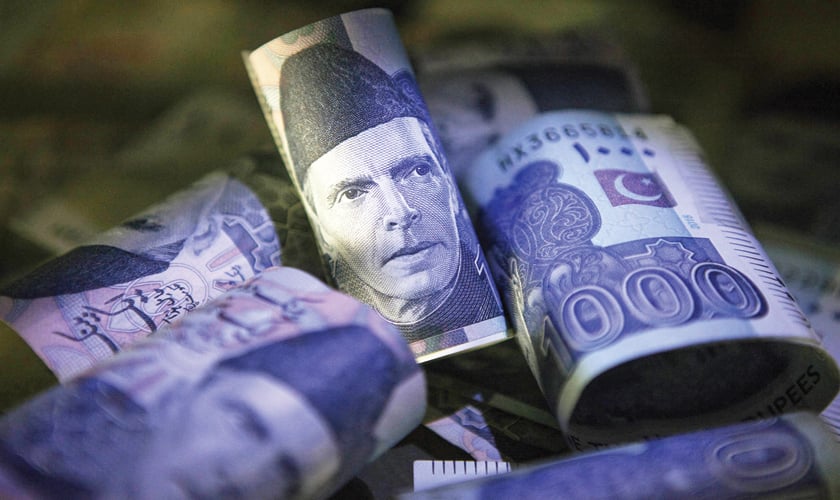INSIGHT
After successful completion of the economic stabilisation programme implemented on the advice of the International Monetary Fund (IMF) over the past three years, the government seems all set to switch from the fiscal tightening strategy to the fiscal expansionary strategy.
 The IMF has commended the government for following its advice and has wished it good luck as it treads towards the growth path.
The IMF has commended the government for following its advice and has wished it good luck as it treads towards the growth path.
“I think that is a sensible approach at this stage,” Masood Ahmed, director of the IMF’s Middle East and Central Asia department, told the media.
“They have built up their reserves, they have halved their budget deficit, their growth rate is pretty much the highest of all countries in the region broadly defined,” he added.“The next phase is to continue with the reforms they have on structural measures that will substantially raise their growth rate and particularly raise their exports.”
The upcoming budget for the fiscal year 2016-17 is more likely to reflect this strategy of the government whereby it will try to achieve higher growth. The government aims to set a target of 5.5 GDP growth for the next fiscal year.
Improved security situation, better energy supplies, low oil prices and increasing pace of work on the China-Pakistan Economic Corridor (CPEC) should all help the government to achieve higher growth in the remaining two years of the tenure in the office.
Therefore, in the coming months and years, one could hope for more economic activity in the country, more job opportunities, more industrial production and a rise in the exports.
But these activities largely hinge on the political stability in the country.
Our economic indicators were as good in 2007 – rather in some ways better – as they are now but the political turmoil unleashed over a row between the then military ruler and the then chief justice ultimately resulted in the loss of what had been achieved on the economic front. The country had swung back to square one.
The World Bank in its report on ‘Global Economic Prospects’ last year maintained that political uncertainty in Pakistan has remained a major factor in the economic progress of the country.
To underline its point about the impact of political stability on economy, the report said easing of the political crisis triggered by the Pakistan Tehreek-e-Insaf (PTI) sit-in in Islamabad in late 2014 has helped the government in achieving strong growth in the service sector. The report said it also paved the way for the conclusion of major infrastructure and energy agreements with China.
Moody’s Credit Service in its latest assessment of Pakistan’s credit profile made a similar conclusion. Though it assessed Pakistan’s economic growth as moderate, it maintained that institutional and fiscal strength in Pakistan are very low while its vulnerability to political risks is very high.
No country in the world is immune to political crisis, but political uncertainty prevails almost perpetually in Pakistan.
Moreover, fiscal and institutional bases in other countries are so strong that they could sustain and easily absorb shocks of the political crises but, unfortunately, Pakistan lacks such strengths.
Though the government currently is basking in the glory of achieving macroeconomic stability in the past three years and is now aimed to capitalise on these achievements in the remaining two years of its tenure, the rising political challenges for its embattled leadership are making its task difficult.
The crisis triggered by the Panama Leaks, involving the children of the prime minister, who were in the business of investing in foreign tax havens, is deepening with each passing day.
Though officials of the State Bank of Pakistan as well as an independent lawyer told the Senate Standing Committee on Finance last week that it is very hard to prove wrongdoings on the basis of Panama Papers before the proposed judicial commission was set up by the chief justice on the prime minister’s request, the opposition seems in no mood to ease its pressure on the government.
Imran Khan’s party has already launched an anti-corruption campaign to mobilise public opinion for its stance, while the Pakistan Peoples Party (PPP) and other opposition parties have also stepped up pressure on the government, though less fervently. They aim to press the government to allow a transparent and impartial probe into the wealth sources of the prime minster and his children.
 The government, which enjoys comfortable majority in the parliament, and controls Punjab, politically the most important province of Pakistan, has also toughened its stance and decided not to succumb to the opposition pressure. It has refused to amend the terms of reference it has prepared for the proposed judicial commission.
The government, which enjoys comfortable majority in the parliament, and controls Punjab, politically the most important province of Pakistan, has also toughened its stance and decided not to succumb to the opposition pressure. It has refused to amend the terms of reference it has prepared for the proposed judicial commission.
Moreover, the reported growing chasm between the government and establishment as evident from the banning of the film Maalik has added to the political uncertainty in the country.
These political tensions may not necessarily destabilise the government, but they could aggravate the political uncertainty that ultimately could negatively impact economic development of the country.
Moreover, it has the potential to detract the government’s attention from its basic responsibilities.
Therefore, the government, the opposition as well as other stakeholders need to act responsibly and not get carried away by the short-term political gain for the sake of the larger national interests.
Though the prime minister is not linked to any offshore companies and thus, legally speaking, there is no onus on him to prove his innocence, he owes a lot morally to the people of Pakistan who have voted him into power.
Such cases are very difficult to be proven in the courts of law, but they are easy to be pleaded in the court of people.
Like a true democratic leader, the prime minister should come out with documentary evidence to establish that he has nothing to do with the London properties and offshore companies and all this fortune was made by his children without his patronage and through sheer hard work of their own.
This is the only way that could save the country from potentially another major political crisis.
Prime Minister Nawaz Sharif may ride through this crisis, as many people believe, but it may continue to haunt him throughout his political life. Therefore, it is high time for him to stand up to the occasion and prove his detractors wrong.
The writer is a senior journalist based in Islamabad